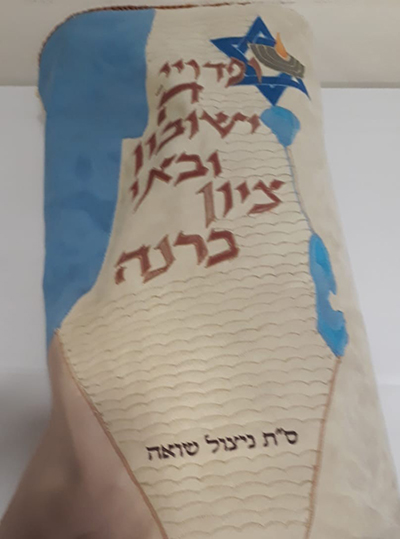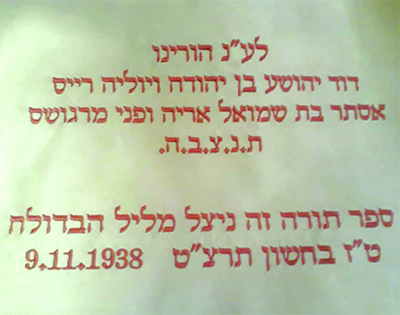
The Lavi Torah
As the Holy Ark was opened the feeling of anticipation in the room was palpable. There wasn’t one person who didn’t feel a connection to the Bar Mitzvah boy who would soon be reading from the Torah. Before the scroll was opened, though, his father cleared his throat and made an announcement:
“This Torah scroll is very special.”
‘);
_avp.push({ tagid: article_top_ad_tagid, alias: ‘/’, type: ‘banner’, zid: ThisAdID, pid: 16, secure: true });
He then read aloud the Hebrew inscriptions on the Torah mantle. On the front was the declaration that the Torah had survived the Holocaust. On the back was the explanation that it had been saved following Kristallnacht.
Sitting on the other side of the mechitzah I was intrigued and decided to make it my business to discover more of the Torah scroll’s history.
Its home is in the four-star Kibbutz Lavi Hotel. It came there via Aryeh who was born on the kibbutz and is currently the security guard at the guesthouse. He proudly shared the scroll’s story with me.
 Almost a century ago, in another world, his grandfather, Shmuel Aryeh, commissioned a Torah scroll to be written in honor of his marriage to Fania. This was in Poland and the scroll was completed in 1923. Not long afterwards the young couple immigrated to Leipzig, Germany. Of course, the Torah scroll came with as they built a new life with their daughter, a life that centered around the synagogue.
Almost a century ago, in another world, his grandfather, Shmuel Aryeh, commissioned a Torah scroll to be written in honor of his marriage to Fania. This was in Poland and the scroll was completed in 1923. Not long afterwards the young couple immigrated to Leipzig, Germany. Of course, the Torah scroll came with as they built a new life with their daughter, a life that centered around the synagogue.
It was well into Hitler’s rule when Shmuel Aryeh’s Torah scroll needed to be mended and was placed inside a storage room in the synagogue until the necessary repairs could be made.
And that’s where it was on the night of November 11, 1938, The Night of Broken Glass, when Nazi storm troopers all across Germany, Austria, and the Sudetenland wreaked havoc in every Jewish community. Torah scrolls, holy books, and other objects of Jewish worship were burned, torn, and vandalized. Jews were beaten, arrested, and murdered.
Hidden away in the storage room, Shmuel Aryeh’s Torah scroll survived the worst pogrom Europe had ever seen.
Shmuel Aryeh didn’t hesitate to rescue the precious scroll. Sneaking it from the storage room, he packed it inside a suitcase hidden between layers of clothing. He then shipped it to his Uncle Baruch in New York. It must have been so difficult to send his Torah scroll away, but he knew by doing so he was saving it.
Just as precious as the scroll was Shmuel Aryeh’s teenage daughter, Esther. It was just as difficult, if not more so, to send her away, but he and Fania knew that by doing so she had a chance to survive. Like so many other parents, they made the heartbreaking decision to take advantage of the Kindertransport. Esther boarded the last one out of Germany on September 1, 1939.
That’s how Esther came to live in England. It was on a farm, training for life in the Holy Land, that she met David, who had come with his yeshiva from Czechoslovakia for the same purpose. After their wedding in Manchester they succeeded in entering Israel and, along with other members of the British Bnai Akiva, founded Kibbutz Lavi in the Galil.
Today, Lavi is a lush, affluent settlement that boasts agricultural and carpentry industries, as well as the hotel. That’s not the way it was seventy years ago. Then the couple lived in a simple wooden shack. Esther worked mostly with the youngsters. Soon the couple had four children of their own.
As Esther reached her fortieth birthday she began to long for her father’s Torah scroll. Contact was made with Uncle Baruch and a cousin from Bat Yam traveled to America to escort the Torah scroll home. There was no question that the scroll belonged with Shmuel Aryeh’s daughter.
 While in England, Esther had received messages from her father until 1944. Then they stopped. Neither he nor her mother survived the Holocaust. Sometimes, especially as she grew older, Esther regretted leaving her parents. If I’d known I’d never see them again I don’t think I could have boarded the train, she would say.
While in England, Esther had received messages from her father until 1944. Then they stopped. Neither he nor her mother survived the Holocaust. Sometimes, especially as she grew older, Esther regretted leaving her parents. If I’d known I’d never see them again I don’t think I could have boarded the train, she would say.
Her four children would comfort her and remind her if she hadn’t left they would not be alive – nor would her twenty-five grandchildren and seventy great-grandchildren.
Esther passed away three years ago. Her name, her memory, and the Torah scroll live on.
As Aryeh finished his story he told me that many of Esther’s grandchildren have learned to read from the special scroll that miraculously survived Europe’s inferno. I listened to his story with glistening eyes. Once again, I’d born witness to the fact that Hashem will never forsake us. The Jewish people will live forever.
‘);
_avp.push({ tagid: article_top_ad_tagid, alias: ‘/’, type: ‘banner’, zid: ThisAdID, pid: 16, onscroll: 10 });








